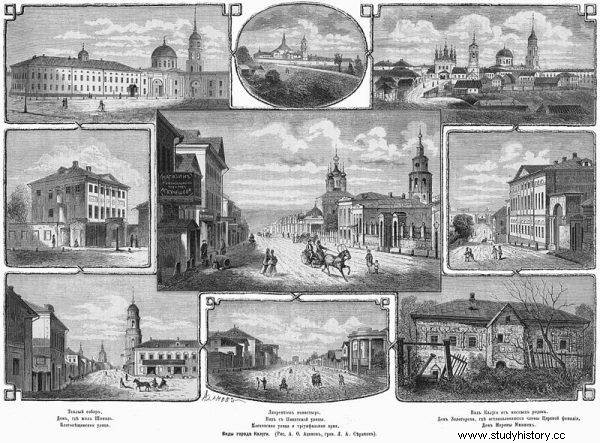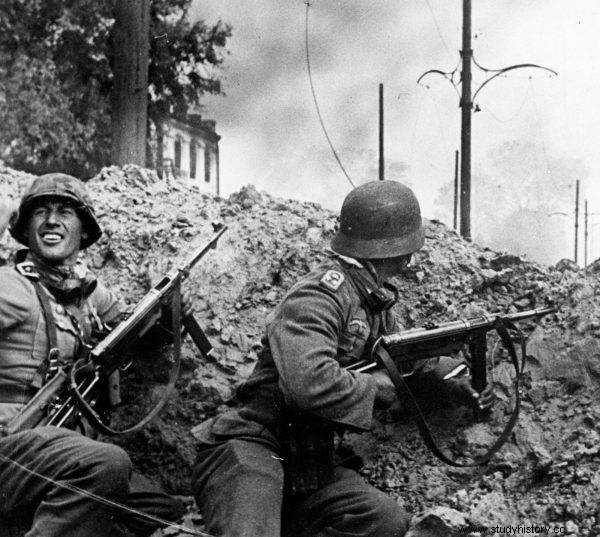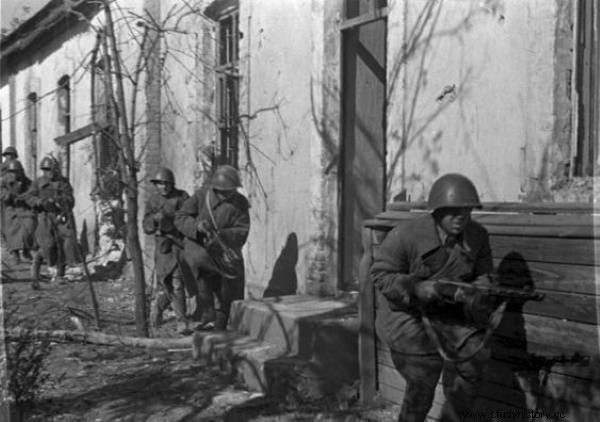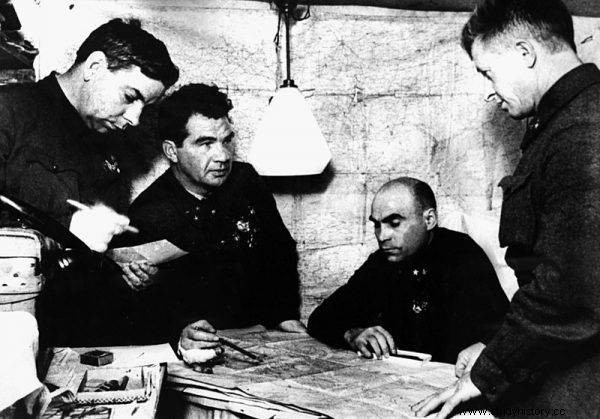Is it possible for a 6-year-old child to survive in the forest without any support? That it would adapt among the front soldiers and engage itself in warfare? The example of little Sergius shows that it is! Although his childhood was far from what could be called normal, he went down in history as the youngest participant in World War II.
Seryozha (Sergey for short) Aleshkov was the youngest participant in the Battle of Stalingrad and probably the youngest soldier of World War II. Documents relating to his birth have been destroyed, but it is estimated that he was born between 1934 and 1936, with 1936 appearing to be the most likely.
"I want to cut the throat of the first Nazi I meet!"
Sergey (Sergiusz in Polish) was born in the small village of Gryn near the city of Kaluga, the capital of the Kaluga region in the European part of Russia. The village was famous for being an important center of the resistance movement after the Third Reich struck Russia.
In the summer of 1942, the Germans came to Gryn. For supporting and hiding the partisans, decided to execute the civilians of the village. Sergius' 10-year-old brother Petya was hanged, and his mother was shot while trying to save her son. Sergey was under the care of a neighbor who at one point, seeing the approaching soldiers, even pushed Sergius out the window and ordered him to run into the forest. She was shot herself. The boy lived alone in the forest until August, when he was found by Soviet scouts.

photo:public domain Sergey (Sergiusz in Polish) was born in the small village of Gryn near the city of Kaluga, the capital of the Kaluga region in the European part of Russia.
He was exhausted both physically and mentally. His body was covered with insect bite marks. The boy was unable to answer the question of how long he had been alone in the forest. The soldiers covered him with a blanket and, disregarding his earlier orders, took him to their quarters. When he was brought to the unit commander, Major Mikhail Vorobiev, he interrupted the military conference, and then said to the nearby soldiers:"I want to go to their trenches even now and cut the throat of the first Nazi with my own hands!".
The major managed to find out the boy's name, but when he inquired about his mother, the little one fell apart completely and cried for a long time. The commander decided that he would temporarily allow him to stay in his 142nd Infantry Regiment, which belonged to the 47th Division.
Sergius was taken to the field hospital, where he was put on his feet. Major Vorobiev was so close to him that he even let him draw a plane on a cast of his right arm. He treated him like his own son. Of course, he fully understood that the front was not a place for a child. But he did not have the heart to send him back to an orphanage. As he did not have a family himself, he decided to adopt a boy with whom he had a strong relationship.
A soldier with a wooden gun
He was called the son of a regiment and each soldier looked after him as best he could. It even got to the point that Sergius told his new father (his biological passed away before the war started) that he would like Nina to become his new mother, who took care of him in the hospital. The major (who had a weakness for her before) proposed to her and they officially became a family after the Battle of Stalingrad.
The boy felt the role of the major's assistant so much that he wanted him to treat him like a real soldier. Therefore, a special military uniform was sewn for him, the shoes were made smaller - the boy looked like a real soldier, but small . Vorobiev assigned him tasks such as delivering mail, newspapers and giving water to the wounded in the hospital. During the operation, Sergius also supplied the soldiers with ammunition and grenades.

German soldiers on the Eastern Front
His new father presented him with a handgun made of wood, which the boy cared for and carried with great pride. One of the soldiers of the detachment also gave him a small pair of binoculars. As it soon turned out, this gift saved the entire regiment. One day, while distributing the press, Sergius was playing with binoculars, observing the surroundings. He noticed a strange movement in the haystack and a military boot sticking out from under it. Without a moment's thought, he ran to the first companion he encountered and reported the suspicious find to him.
Sergius enjoyed such great recognition and respect that despite the fact that the soldiers were just eating their meal, they interrupted it and went to the place indicated by the little boy. It turned out that the Germans camouflaged there with a radio station, thanks to which they aimed artillery at the target. The day before, Soviet positions were bombed in this way.
The Russians completely surprised the enemy - one was shot and the other two were taken prisoner. Sergius, as a true soldier, believing that he only fulfills his duties, did not even boast of the commander (his father). He finally learned about his feat from one of his subordinates. The little hero received official congratulations on his achievement.
Hero of Stalingrad
The 142nd Infantry Regiment was ordered to go to Stalingrad as support for the troops fighting there. On the way, the major's car, in which Sergius was also found, ran over a mine. The driver and Vorobiev's faithful adviser died on the spot, the major was injured, and Sergius… he didn't even have a scratch, even though the blast of the explosion blew his small body out of the car. He soon found his stepfather to take care of him properly.
On November 18, 1942, Sergius and several soldiers from his unit came under intense German fire. One of the ricochets injured his leg, so he was hospitalized again. As soon as it was found that the wound had healed sufficiently, the boy returned to his ward. Together with the fighting soldiers, he lived to see the Germans driven out of Stalingrad and their army in that area was finally defeated.
One incident in particular near Stalingrad deserves special attention:during one of the German attacks, several missiles fell dangerously close to Soviet positions. The commander's dugout was destroyed. Nobody but Sergius noticed that Major Vorobiev was under fire. A frightened boy ran to him and noticed that the place where he had last seen his father was covered with tree limbs. Though he tried with all his might to push them back, he wasn't strong enough.

The Russians at Stalingrad
As soon as possible, he ran to the nearest soldiers and informed them of the event. They immediately went to the indicated place. They found a wounded but - most importantly - alive major under the trees. Thus, Sergius saved not only his father, but also the commander. For this feat, he was awarded the "For Military Merit" distinction. Marshal Vasily Ivanovich Chuikov, in a gesture of appreciation, presented the decorated Sergius with a real pistol - most likely it was Walther P38.
The little soldier could speak of great luck once more: one of the soldiers, for a joke, allowed him to put on his officer's outfit. Unexpectedly, a German plane appeared in the sky. The pilot assumed that he had found a Soviet officer and opened fire on him with the deck weapon. The bullet scratched little Sergius in the heel, for which he was later reprimanded by his father.
Together with his regiment, Sergius pressed farther and farther west, pushing the Germans out of his country. He reached his home village of Gryn. Thanks to the surviving inhabitants, it was possible to recreate the boy's story. They learned about the fate of his mother, older brother and neighbor to whom he owed his life. Information was also obtained that the two oldest brothers - Ivan and Andrew - are also fighting at the front.
Son of a regiment
While fighting was taking place in Poland, Sergiusz's new mother, Nina Bedova, became pregnant and left the unit. Only a few months after giving birth, she returned to her husband, who received the rank of colonel, and stayed with him until the fall of Berlin. After the war and demobilization, they settled in the city of Chelyabinsk in the Urals, where they led a quiet life.
Sergiusz's military career ended in 1944 on the Vistula River. The commander of the 62nd Army, Vasily Chuikov, sent Sergius to the village of Tula nad Upa, where the boy was to begin his education at the Suvorov school. Due to health problems (Sergius, following the example of soldiers, smoked from an early age), he was rejected, but Chuikov himself intervened in his case.

The commander of the 62nd Army, Vasily Chuikov, sent Sergius to the village of Tula nad Upa, where he was to begin his education at the Suvorov school.
This school was established just for the "sons of the regiment" and young partisans from Leningrad, whose presence in the troops was not welcomed by the command when the Soviet army entered the enemy territory. Sergius along with 30 other boys became the first year of this school. Despite the passage of years, he remained very short and stocky, probably due to the frontline life in his early childhood. However, he compensated for his imperfections with a very strong psyche. It is worth adding that he received one more military decoration - in 1945 he was awarded the "Victory over Germany" order.
Sergius graduated from school in 1954. Then he began studying law at the Kharkiv Institute. After completing his education, he moved to Chelyabinsk to be closer to his family. He got a job as an advisor in a plexiglass factory. His personal life was not going very well. He was married and divorced twice. However, he had a daughter and a son. His adoptive parents enjoyed great recognition in Chelyabinsk, especially after his father wrote and published a book of war memoirs in 1984, the main part of which was devoted to Sergius.
In 1990, at the age of only 54, Sergius suffered a heart attack at a bus stop. Due to his poor health, it was impossible to save him. In 2019, a Russian-produced film was made in his honor, called Soldatik known in the West as Soldier Boy .
Filmography:
- Soldier Boy , Janson Media, Mosfilm, Russia 2019.
